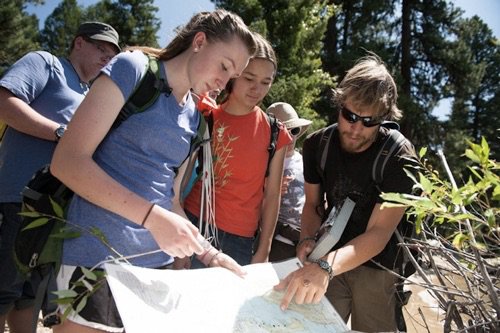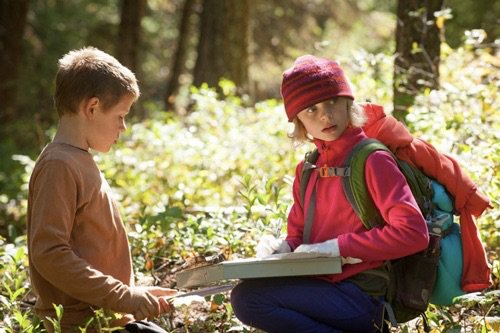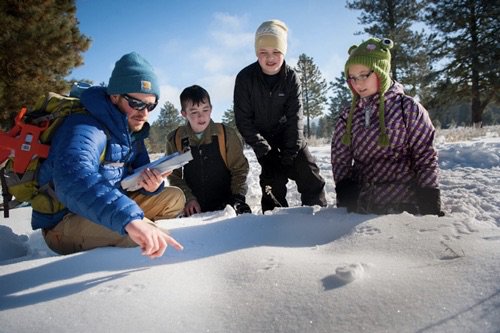ULIEA Winner Q & A: Introducing The Mccall Outdoor Science School (Moss)
UL and the North American Association for Environmental Education developed the UL Innovative Education Awards (ULIEA) in 2015 to honor programs in the United States and Canada that are leading the way in project-based learning, community citizenship and using the environment as a platform to STEM learning (E-STEM). In 2015, awards went to five organizations that created sustainable community solutions and provided innovative K-12 programming to solve real-world environmental issues.
This 2015 Tier 3 winner, McCall Outdoor Science School (MOSS), connects students to peers, mentors, community leaders, and experts working for E-STEM initiatives to help improve Idaho's land, water, and communities using problem-based and inquiry-based approaches. We're excited to tell you their story through their words.
University of Idaho, McCall Outddor Science School (MOSS), 2015 ULIEA Tier 3 Winner :
ULIEA: Tell us about your organization
MOSS is an award-winning program of the University of Idaho (UI) College of Natural Resources (CNR) located in McCall, Idaho along the shores of stunning Payette Lake. We facilitate place-based, collaborative E-STEM inquiry through the context of Idaho's land, water and communities. MOSS has five program areas: 1) Youth Programs; 2) Graduate Residency Program; 3) Teacher Professional Development; 4) Educational and Environmental Research; and 5) Community Programs.
MOSS serves Preschool students, K-12 students, undergraduate and graduate students, pre-service and in-service K-12 teachers and general community members. Fifty-three percent of the students we serve are from schools eligible for Federal Title I status (at least 40% of students come from low-income families).
ULIEA: Tell us about your award-winning program
The goals of our curriculum are to foster scientific literacy, help students develop a sense of place, and promote community skills. We connect students to the landscapes and people of Idaho in ways that make learning relevant and meaningful. The outdoor environment is our textbook, and the subject matter literally comes alive for students outside the walls of the classroom. We use problem-based and inquiry-based approaches that have students work in small groups to solve complex, real-world problems with less-than-straightforward solutions. We emphasize an integrated version of E-STEM in which students ask questions, engage in science practices, think critically, use creativity to solve problems, and work collaboratively with their peers. We encourage and provide opportunities for students to communicate their findings to a broad audience of their peers, their parents, and other students through accessible technology and an online forum. Imagine an entire school year based on an adventure-based learning model where collaborative inquiry, integrated subjects, technology, low student-teacher ratios and authentic learning experiences are the everyday norm, not just a special field trip. MOSS is making it happen in Idaho one expedition at a time.
Adventure-based learning (AL) provides students and teachers with opportunities to explore real-world E-STEM issues by combining place-based expeditions with collaborative online environments, all of which is anchored in inquiry-based learning. For example, within an AL expedition, K-12 students and teachers interact with graduate student and university faculty researchers creating opportunities for collaborative learning. Learners collect data and connect what they observe in the field with their current knowledge base. They then present potential solutions to relevant issues based on the scientific method.
Participants engage in experiences born from leading-edge university research. Our historic lakeside field campus high in the Idaho Rocky Mountains provides the ideal setting for K-12 students and teachers to take E-STEM concepts such as climate change and biofuel production from the realm of abstract theory, to first-hand observation. Resident graduate students engage in research, take university courses, and teach K-12 students in the field. MOSS therefore represents a unique link between the Idaho K-12 education system and its university counterpart. We challenge the traditional understanding of what science is, how it is practiced, and who can participate. Our vision is that, when describing the people involved in doing E-STEM, teachers and students talk about themselves. In this spirit, inquiry, leadership and discovery happens at every level from our PhD level faculty to graduate students, teachers and K-12 students, who share their experiences with classrooms and parents back home. The common thread of E-STEM discovery runs throughout the entire process, the needle led by a strong vision and set of values.
ULIEA: Why did you include an environmental piece with the STEM initiative?
We have been an environmentally focused education program since our founding in 2001. We believe teaching young children E-STEM principles will help them naturally become future environmental problem solvers. The more children we reach, the more we can influence the next generation to tackle our most vexing environmental challenges and become leaders for change among their peers.
ULIEA: How has your program been received by the community?
The Idaho education community embraces the innovative programming we provide. In 2012, we competed with 180 nominees statewide to win the J.A. and Kathryn Albertson Foundation "Idaho 21st Century Award" for challenging traditional education with creativity and innovation.
ULIEA: What is your program's biggest success? What do you hope to achieve?
Our biggest accomplishment is giving 30,000 Idaho kids and counting an opportunity to explore and engage in innovative E-STEM programming that changes how they see themselves and the world around them. Our vision is that, when describing the people involved in doing E-STEM, teachers and students talk about themselves.
ULIEA: How will the ULIEA grant money help your program?
The ULIEA grant money allowed us to sponsor a UL E-STEM Doctoral Scholar. Ileana M. Freytes-Ortiz is a Ph.D. Candidate in Marine Science, College of Marine Science, University of South Florida, Tampa, FL. As a member of a traditionally underrepresented group in STEM, Ileana has played a critical role in helping us develop culturally relevant E-STEM programming for Latino youth in Idaho.
ULIEA: What does it mean to be a ULIEA Winner?
It is an honor to have been recognized by two respected organizations like UL and NAAEE, as one of the best E-STEM programs in North America. Since we operate in a highly competitive University-level environment, it is important for programs like ours to build credibility through peer review and awards like these.


